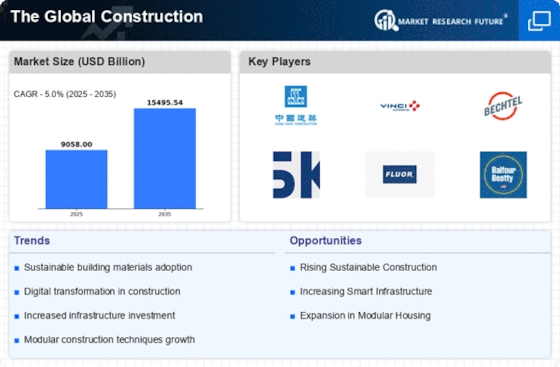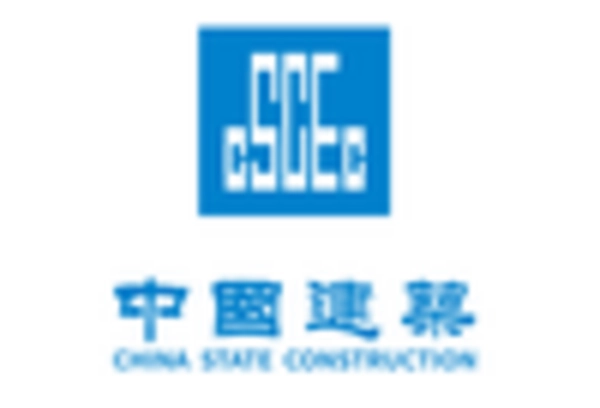-
EXECUTIVE SUMMARY
-
MARKET INTRODUCTION
-
DEFINITION
-
SCOPE OF THE STUDY
-
RESEARCH OBJECTIVE
-
MARKET STRUCTURE
-
KEY BUYING CRITERIA
-
RESEARCH METHODOLOGY
-
OVERVIEW
-
DATA FLOW
- DATA MINING PROCESS
-
PURCHASED DATABASE:
-
SECONDARY SOURCES:
- SECONDARY RESEARCH DATA FLOW:
-
PRIMARY RESEARCH:
- PRIMARY RESEARCH DATA FLOW:
- PRIMARY RESEARCH: NUMBER OF INTERVIEWS CONDUCTED
- PRIMARY RESEARCH: REGIONAL COVERAGE
-
APPROACHES FOR MARKET SIZE ESTIMATION:
- CONSUMPTION & NET TRADE APPROACH
- REVENUE ANALYSIS APPROACH
-
DATA FORECASTING
- DATA FORECASTING TECHNIQUE
-
DATA MODELING
- MICROECONOMIC FACTOR ANALYSIS:
- DATA MODELING:
-
TEAMS AND ANALYST CONTRIBUTION
-
MARKET DYNAMICS
-
INTRODUCTION
-
DRIVERS
- RISING URBANIZATION FUELING DEMAND FOR RESIDENTIAL AND COMMERCIAL PROJECTS
- GOVERNMENT INVESTMENTS BOOSTING INFRASTRUCTURE AND SMART CITY DEVELOPMENTS
-
RESTRAINTS
- RISING RAW MATERIAL COSTS IMPACT OVERALL CONSTRUCTION PROJECT BUDGETS
- STRINGENT ENVIRONMENTAL REGULATIONS INCREASE OPERATIONAL COMPLIANCE COSTS
-
OPPORTUNITY
- GREEN BUILDING PRACTICES ARE CREATING NEW SUSTAINABLE CONSTRUCTION OPPORTUNITIES
- TECHNOLOGICAL ADVANCEMENTS ARE ENHANCING PRODUCTIVITY AND PROJECT MANAGEMENT EFFICIENCY
-
IMPACT ANALYSIS OF COVID - 19
- IMPACT ON OVERALL CONSTRUCTION
- IMPACT ON GLOBAL CONSTRUCTION MARKET
- IMPACT ON SUPPLY CHAIN OF CONSTRUCTION MARKET
- IMPACT ON MARKET DEMAND OF CONSTRUCTION MARKET
- IMPACT ON PRICING OF CONSTRUCTION MARKET
-
MARKET FACTOR ANALYSIS
-
SUPPLY CHAIN ANALYSIS
- RAW MATERIAL SUPPLIERS AND MANUFACTURERS
- LOGISTICS AND DISTRIBUTION CHANNELS
- CONSTRUCTION CONTRACTORS AND SUBCONTRACTORS
- END-CONSUMERS AND REAL ESTATE DEVELOPMENT
-
PORTER’S FIVE FORCES MODEL
- THREAT OF NEW ENTRANTS
- BARGAINING POWER OF SUPPLIERS
- THREAT OF SUBSTITUTES
- BARGAINING POWER OF BUYERS
- INTENSITY OF RIVALRY
-
GLOBAL CONSTRUCTION MARKET, BY TYPE OF CONSTRUCTION
-
INTRODUCTION
-
BUILDINGS CONSTRUCTION
-
HEAVY AND CIVIL ENGINEERING CONSTRUCTION
-
SPECIALTY TRADE CONTRACTORS
-
LAND PLANNING AND DEVELOPMENT
-
GLOBAL CONSTRUCTION MARKET, BY END-USE SECTOR
-
INTRODUCTION
-
PRIVATE
-
PUBLIC
-
GLOBAL CONSTRUCTION MARKET, BY TYPE OF CONTRACTOR
-
INTRODUCTION
-
LARGE CONTRACTOR
-
SMALL CONTRACTOR
-
GLOBAL CONSTRUCTION MARKET, BY REGION
-
OVERVIEW
-
NORTH AMERICA
- US
- CANADA
-
EUROPE
- GERMANY
- UK
- FRANCE
- RUSSIA
- ITALY
- SPAIN
- REST OF EUROPE
-
ASIA PACIFIC
- CHINA
- INDIA
- JAPAN
- SOUTH KOREA
- MALAYSIA
- THAILAND
- INDONESIA
- REST OF ASIA-PACIFIC
-
SOUTH AMERICA
- BRAZIL
- MEXICO
- ARGENTINA
- REST OF SOUTH AMERICA
-
MIDDLE EAST & AFRICA
- GCC COUNTRIES
- SOUTH AFRICA
- REST OF MIDDLE EAST & AFRICA
-
COMPETITIVE LANDSCAPE
-
COMPETITIVE OVERVIEW
-
MAJOR PLAYERS IN THE GLOBAL CONSTRUCTION MARKET
-
MAJOR PLAYERS IN TERMS OF MARKET DISRUPTORS & INNOVATORS
-
COMPETITIVE BENCHMARKING
-
STRATEGIES OF MARKET LEADERS IN THE GLOBAL CONSTRUCTION MARKET
- BOUYGUES S.A.
- POWER CONSTRUCTION CORPORATION OF CHINA
- ACS GROUP
- D.R. HORTON, INC.
- LENNAR CORPORATION
-
LEADING PLAYERS IN TERMS OF THE NUMBER OF DEVELOPMENTS IN GLOBAL PPF MARKET
-
KEY DEVELOPMENTS & GROWTH STRATEGIES
- CONTRACTS & AGREEMENT
- PRODUCT LAUNCH/PRODUCT DEVELOPMENT
- PARTNERSHIPS/ACQUISITION
-
COMPANY PROFILES
-
ACS GROUP
- COMPANY OVERVIEW
- FINANCIAL OVERVIEW
- PRODUCTS/SERVICES OFFERED
- KEY DEVELOPMENTS
- SWOT ANALYSIS
- KEY STRATEGIES
-
LENNAR CORPORATION
- COMPANY OVERVIEW
- FINANCIAL OVERVIEW
- PRODUCTS OFFERED
- KEY DEVELOPMENTS
- SWOT ANALYSIS
- KEY STRATEGIES
-
D.R. HORTON, INC.
- COMPANY OVERVIEW
- FINANCIAL OVERVIEW
- PRODUCTS OFFERED
- KEY DEVELOPMENTS
- SWOT ANALYSIS
- KEY STRATEGIES
-
BOUYGUES S.A.
- COMPANY OVERVIEW
- FINANCIAL OVERVIEW
- PRODUCTS OFFERED
- KEY DEVELOPMENTS
- SWOT ANALYSIS
- KEY STRATEGIES
-
POWER CONSTRUCTION CORPORATION OF CHINA
- COMPANY OVERVIEW
- FINANCIAL OVERVIEW
- PRODUCTS/SERVICES OFFERED
- KEY DEVELOPMENTS
- SWOT ANALYSIS
- KEY STRATEGIES
-
CIMIC GROUP LIMITED
- COMPANY OVERVIEW
- FINANCIAL OVERVIEW
- PRODUCTS OFFERED
- KEY DEVELOPMENTS
- SWOT ANALYSIS
- KEY STRATEGIES
-
SHIMIZU CORPORATION
- COMPANY OVERVIEW
- FINANCIAL OVERVIEW
- PRODUCTS OFFERED
- KEY DEVELOPMENTS
- SWOT ANALYSIS
- KEY STRATEGIES
-
LENDLEASE GROUP
- COMPANY OVERVIEW
- FINANCIAL OVERVIEW
- PRODUCTS OFFERED
- KEY DEVELOPMENTS
- SWOT ANALYSIS
- KEY STRATEGIES
-
CAPITALAND GROUP PTE. LTD
- COMPANY OVERVIEW
- FINANCIAL OVERVIEW
- PRODUCTS OFFERED
- KEY DEVELOPMENTS
- SWOT ANALYSIS
- KEY STRATEGIES
-
LARSEN & TOUBRO LIMITED
- COMPANY OVERVIEW
- FINANCIAL OVERVIEW
- PRODUCTS OFFERED
- KEY DEVELOPMENTS
- SWOT ANALYSIS
- KEY STRATEGIES
-
LIST OF TABLES
-
QFD MODELING FOR MARKET SHARE ASSESSMENT
-
GLOBAL CONSTRUCTION MARKET, BY TYPE OF CONSTRUCTION, 2019-2035 (USD BILLION)
-
GLOBAL CONSTRUCTION MARKET, BY END-USE SECTOR, 2019-2035 (USD BILLION)
-
GLOBAL CONSTRUCTION MARKET, BY TYPE OF CONTRACTOR, 2019-2035 (USD BILLION)
-
GLOBAL CONSTRUCTION MARKET, BY REGION, 2019-2035 (USD BILLION)
-
NORTH AMERICA CONSTRUCTION MARKET, BY COUNTRY, 2019-2035 (USD BILLION)
-
NORTH AMERICA CONSTRUCTION MARKET, BY TYPE OF CONSTRUCTION, 2019-2035 (USD BILLION)
-
NORTH AMERICA CONSTRUCTION MARKET, BY END-USE SECTOR, 2019-2035 (USD BILLION)
-
NORTH AMERICA CONSTRUCTION MARKET, BY TYPE OF CONTRACTOR, 2019-2035 (USD BILLION)
-
US CONSTRUCTION MARKET, BY TYPE OF CONSTRUCTION, 2019-2035 (USD BILLION)
-
US CONSTRUCTION MARKET, BY END-USE SECTOR, 2019-2035 (USD BILLION)
-
US CONSTRUCTION MARKET, BY TYPE OF CONTRACTOR, 2019-2035 (USD BILLION)
-
CANADA CONSTRUCTION MARKET, BY TYPE OF CONSTRUCTION, 2019-2035 (USD BILLION)
-
CANADA CONSTRUCTION MARKET, BY END-USE SECTOR, 2019-2035 (USD BILLION)
-
CANADA CONSTRUCTION MARKET, BY TYPE OF CONTRACTOR, 2019-2035 (USD BILLION)
-
EUROPE CONSTRUCTION MARKET, BY COUNTRY, 2019-2035 (USD BILLION)
-
EUROPE CONSTRUCTION MARKET, BY TYPE OF CONSTRUCTION, 2019-2035 (USD BILLION)
-
EUROPE CONSTRUCTION MARKET, BY END-USE SECTOR, 2019-2035 (USD BILLION)
-
EUROPE CONSTRUCTION MARKET, BY TYPE OF CONTRACTOR, 2019-2035 (USD BILLION)
-
GERMANY CONSTRUCTION MARKET, BY TYPE OF CONSTRUCTION, 2019-2035 (USD BILLION)
-
GERMANY CONSTRUCTION MARKET, BY END-USE SECTOR, 2019-2035 (USD BILLION)
-
GERMANY CONSTRUCTION MARKET, BY TYPE OF CONTRACTOR, 2019-2035 (USD BILLION)
-
UK CONSTRUCTION MARKET, BY TYPE OF CONSTRUCTION, 2019-2035 (USD BILLION)
-
UK CONSTRUCTION MARKET, BY END-USE SECTOR, 2019-2035 (USD BILLION)
-
UK CONSTRUCTION MARKET, BY TYPE OF CONTRACTOR, 2019-2035 (USD BILLION)
-
FRANCE CONSTRUCTION MARKET, BY TYPE OF CONSTRUCTION, 2019-2035 (USD BILLION)
-
FRANCE CONSTRUCTION MARKET, BY END-USE SECTOR, 2019-2035 (USD BILLION)
-
FRANCE CONSTRUCTION MARKET, BY TYPE OF CONTRACTOR, 2019-2035 (USD BILLION)
-
RUSSIA CONSTRUCTION MARKET, BY TYPE OF CONSTRUCTION, 2019-2035 (USD BILLION)
-
RUSSIA CONSTRUCTION MARKET, BY END-USE SECTOR, 2019-2035 (USD BILLION)
-
RUSSIA CONSTRUCTION MARKET, BY TYPE OF CONTRACTOR, 2019-2035 (USD BILLION)
-
ITALY CONSTRUCTION MARKET, BY TYPE OF CONSTRUCTION, 2019-2035 (USD BILLION)
-
ITALY CONSTRUCTION MARKET, BY END-USE SECTOR, 2019-2035 (USD BILLION)
-
ITALY CONSTRUCTION MARKET, BY TYPE OF CONTRACTOR, 2019-2035 (USD BILLION)
-
SPAIN CONSTRUCTION MARKET, BY TYPE OF CONSTRUCTION, 2019-2035 (USD BILLION)
-
SPAIN CONSTRUCTION MARKET, BY END-USE SECTOR, 2019-2035 (USD BILLION)
-
SPAIN CONSTRUCTION MARKET, BY TYPE OF CONTRACTOR, 2019-2035 (USD BILLION)
-
REST OF EUROPE CONSTRUCTION MARKET, BY TYPE OF CONSTRUCTION, 2019-2035 (USD BILLION)
-
REST OF EUROPE CONSTRUCTION MARKET, BY END-USE SECTOR, 2019-2035 (USD BILLION)
-
REST OF EUROPE CONSTRUCTION MARKET, BY TYPE OF CONTRACTOR, 2019-2035 (USD BILLION)
-
ASIA PACIFIC CONSTRUCTION MARKET, BY COUNTRY, 2019-2035 (USD BILLION)
-
ASIA PACIFIC CONSTRUCTION MARKET, BY TYPE OF CONSTRUCTION, 2019-2035 (USD BILLION)
-
ASIA PACIFIC CONSTRUCTION MARKET, BY END-USE SECTOR, 2019-2035 (USD BILLION)
-
ASIA PACIFIC CONSTRUCTION MARKET, BY TYPE OF CONTRACTOR, 2019-2035 (USD BILLION)
-
CHINA CONSTRUCTION MARKET, BY TYPE OF CONSTRUCTION, 2019-2035 (USD BILLION)
-
CHINA CONSTRUCTION MARKET, BY END-USE SECTOR, 2019-2035 (USD BILLION)
-
CHINA CONSTRUCTION MARKET, BY TYPE OF CONTRACTOR, 2019-2035 (USD BILLION)
-
INDIA CONSTRUCTION MARKET, BY TYPE OF CONSTRUCTION, 2019-2035 (USD BILLION)
-
INDIA CONSTRUCTION MARKET, BY END-USE SECTOR, 2019-2035 (USD BILLION)
-
INDIA CONSTRUCTION MARKET, BY TYPE OF CONTRACTOR, 2019-2035 (USD BILLION)
-
JAPAN CONSTRUCTION MARKET, BY TYPE OF CONSTRUCTION, 2019-2035 (USD BILLION)
-
JAPAN CONSTRUCTION MARKET, BY END-USE SECTOR, 2019-2035 (USD BILLION)
-
JAPAN CONSTRUCTION MARKET, BY TYPE OF CONTRACTOR, 2019-2035 (USD BILLION)
-
SOUTH KOREA CONSTRUCTION MARKET, BY TYPE OF CONSTRUCTION, 2019-2035 (USD BILLION)
-
SOUTH KOREA CONSTRUCTION MARKET, BY END-USE SECTOR, 2019-2035 (USD BILLION)
-
SOUTH KOREA CONSTRUCTION MARKET, BY TYPE OF CONTRACTOR, 2019-2035 (USD BILLION)
-
MALAYSIA CONSTRUCTION MARKET, BY TYPE OF CONSTRUCTION, 2019-2035 (USD BILLION)
-
MALAYSIA CONSTRUCTION MARKET, BY END-USE SECTOR, 2019-2035 (USD BILLION)
-
MALAYSIA CONSTRUCTION MARKET, BY TYPE OF CONTRACTOR, 2019-2035 (USD BILLION)
-
THAILAND CONSTRUCTION MARKET, BY TYPE OF CONSTRUCTION, 2019-2035 (USD BILLION)
-
THAILAND CONSTRUCTION MARKET, BY END-USE SECTOR, 2019-2035 (USD BILLION)
-
THAILAND CONSTRUCTION MARKET, BY TYPE OF CONTRACTOR, 2019-2035 (USD BILLION)
-
INDONESIA CONSTRUCTION MARKET, BY TYPE OF CONSTRUCTION, 2019-2035 (USD BILLION)
-
INDONESIA CONSTRUCTION MARKET, BY END-USE SECTOR, 2019-2035 (USD BILLION)
-
INDONESIA CONSTRUCTION MARKET, BY TYPE OF CONTRACTOR, 2019-2035 (USD BILLION)
-
REST OF ASIA-PACIFIC CONSTRUCTION MARKET, BY TYPE OF CONSTRUCTION, 2019-2035 (USD BILLION)
-
REST OF ASIA-PACIFIC CONSTRUCTION MARKET, BY END-USE SECTOR, 2019-2035 (USD BILLION)
-
REST OF ASIA-PACIFIC CONSTRUCTION MARKET, BY TYPE OF CONTRACTOR, 2019-2035 (USD BILLION)
-
SOUTH AMERICA CONSTRUCTION MARKET, BY COUNTRY, 2019-2035 (USD BILLION)
-
SOUTH AMERICA CONSTRUCTION MARKET, BY TYPE OF CONSTRUCTION, 2019-2035 (USD BILLION)
-
SOUTH AMERICA CONSTRUCTION MARKET, BY END-USE SECTOR, 2019-2035 (USD BILLION)
-
SOUTH AMERICA CONSTRUCTION MARKET, BY TYPE OF CONTRACTOR, 2019-2035 (USD BILLION)
-
BRAZIL CONSTRUCTION MARKET, BY TYPE OF CONSTRUCTION, 2019-2035 (USD BILLION)
-
BRAZIL CONSTRUCTION MARKET, BY END-USE SECTOR, 2019-2035 (USD BILLION)
-
BRAZIL CONSTRUCTION MARKET, BY TYPE OF CONTRACTOR, 2019-2035 (USD BILLION)
-
MEXICO CONSTRUCTION MARKET, BY TYPE OF CONSTRUCTION, 2019-2035 (USD BILLION)
-
MEXICO CONSTRUCTION MARKET, BY END-USE SECTOR, 2019-2035 (USD BILLION)
-
MEXICO CONSTRUCTION MARKET, BY TYPE OF CONTRACTOR, 2019-2035 (USD BILLION)
-
ARGENTINA CONSTRUCTION MARKET, BY TYPE OF CONSTRUCTION, 2019-2035 (USD BILLION)
-
ARGENTINA CONSTRUCTION MARKET, BY END-USE SECTOR, 2019-2035 (USD BILLION)
-
ARGENTINA CONSTRUCTION MARKET, BY TYPE OF CONTRACTOR, 2019-2035 (USD BILLION)
-
REST OF SOUTH AMERICA CONSTRUCTION MARKET, BY TYPE OF CONSTRUCTION, 2019-2035 (USD BILLION)
-
REST OF SOUTH AMERICA CONSTRUCTION MARKET, BY END-USE SECTOR, 2019-2035 (USD BILLION)
-
REST OF SOUTH AMERICA CONSTRUCTION MARKET, BY TYPE OF CONTRACTOR, 2019-2035 (USD BILLION)
-
MIDDLE EAST & AFRICA CONSTRUCTION MARKET, BY COUNTRY, 2019-2035 (USD BILLION)
-
MIDDLE EAST & AFRICA CONSTRUCTION MARKET, BY TYPE OF CONSTRUCTION, 2019-2035 (USD BILLION)
-
MIDDLE EAST & AFRICA CONSTRUCTION MARKET, BY END-USE SECTOR, 2019-2035 (USD BILLION)
-
MIDDLE EAST & AFRICA CONSTRUCTION MARKET, BY TYPE OF CONTRACTOR, 2019-2035 (USD BILLION)
-
GCC COUNTRIES CONSTRUCTION MARKET, BY TYPE OF CONSTRUCTION, 2019-2035 (USD BILLION)
-
GCC COUNTRIES CONSTRUCTION MARKET, BY END-USE SECTOR, 2019-2035 (USD BILLION)
-
GCC COUNTRIES CONSTRUCTION MARKET, BY TYPE OF CONTRACTOR, 2019-2035 (USD BILLION)
-
SOUTH AFRICA CONSTRUCTION MARKET, BY TYPE OF CONSTRUCTION, 2019-2035 (USD BILLION)
-
SOUTH AFRICA CONSTRUCTION MARKET, BY END-USE SECTOR, 2019-2035 (USD BILLION)
-
SOUTH AFRICA CONSTRUCTION MARKET, BY TYPE OF CONTRACTOR, 2019-2035 (USD BILLION)
-
REST OF MIDDLE EAST & AFRICA CONSTRUCTION MARKET, BY TYPE OF CONSTRUCTION, 2019-2035 (USD BILLION)
-
REST OF MIDDLE EAST & AFRICA CONSTRUCTION MARKET, BY END-USE SECTOR, 2019-2035 (USD BILLION)
-
REST OF MIDDLE EAST & AFRICA CONSTRUCTION MARKET, BY TYPE OF CONTRACTOR, 2019-2035 (USD BILLION)
-
MAJOR PLAYERS IN TERMS OF MARKET DISRUPTORS & INNOVATORS
-
THE MOST ACTIVE PLAYERS IN THE GLOBAL PPF MARKET
-
CONTRACTS & AGREEMENT
-
PRODUCT LAUNCH/PRODUCT DEVELOPMENT
-
PARTNERSHIPS/ACQUISITION
-
ACS GROUP: PRODUCTS/SERVICES OFFERED
-
LENNAR CORPORATION: PRODUCTS OFFERED
-
LENNAR CORPORATION: KEY DEVELOPMENTS
-
D.R. HORTON, INC.: PRODUCTS OFFERED
-
BOUYGUES S.A.: PRODUCTS OFFERED
-
POWER CONSTRUCTION CORPORATION OF CHINA: PRODUCTS/SERVICES OFFERED
-
POWER CONSTRUCTION CORPORATION OF CHINA: KEY DEVELOPMENTS
-
CIMIC GROUP LIMITED: PRODUCTS OFFERED
-
CIMIC GROUP LIMITED: KEY DEVELOPMENTS
-
SHIMIZU CORPORATION: PRODUCTS OFFERED
-
SHIMIZU CORPORATION: KEY DEVELOPMENTS
-
LENDLEASE GROUP: PRODUCTS OFFERED
-
CAPITALAND GROUP PTE. LTD: PRODUCTS OFFERED
-
LARSEN & TOUBRO LIMITED: PRODUCTS OFFERED
-
LARSEN & TOUBRO LIMITED: KEY DEVELOPMENTS
-
LIST OF FIGURES
-
GLOBAL RISE OF URBANIZATION (2019–2035)
-
GLOBAL CONSTRUCTION MARKET SNAPSHOT, 2024
-
GLOBAL CONSTRUCTION MARKET: STRUCTURE
-
KEY BUYING CRITERIA FOR CONSTRUCTION
-
GLOBAL CONSTRUCTION MARKET: MARKET DYNAMICS
-
DRIVER IMPACT ANALYSIS (2019-2035)
-
RESTRAINT IMPACT ANALYSIS (2019-2035)
-
SUPPLY CHAIN ANALYSIS: GLOBAL CONSTRUCTION MARKET
-
PORTER’S FIVE FORCES MODEL: GLOBAL CONSTRUCTION MARKET
-
GLOBAL CONSTRUCTION MARKET, BY TYPE OF CONSTRUCTION, 2024 (% SHARE)
-
GLOBAL CONSTRUCTION MARKET, BY END-USE SECTOR, 2024 (% SHARE)
-
GLOBAL CONSTRUCTION MARKET, BY TYPE OF CONTRACTOR, 2024 (% SHARE)
-
GLOBAL MARKET: COMPARATIVE ANALYSIS
-
GLOBAL CONSTRUCTION MARKET, BY REGION, 2024 (% SHARE)
-
NORTH AMERICA MARKET: COMPARATIVE ANALYSIS
-
NORTH AMERICA CONSTRUCTION MARKET, BY COUNTRY, 2024 (% SHARE)
-
EUROPE MARKET: COMPARATIVE ANALYSIS
-
EUROPE CONSTRUCTION MARKET, BY COUNTRY, 2024 (% SHARE)
-
ASIA PACIFIC MARKET: COMPARATIVE ANALYSIS
-
ASIA PACIFIC CONSTRUCTION MARKET, BY COUNTRY, 2024 (% SHARE)
-
SOUTH AMERICA MARKET: COMPARATIVE ANALYSIS
-
SOUTH AMERICA CONSTRUCTION MARKET, BY COUNTRY, 2024 (% SHARE)
-
MIDDLE EAST & AFRICA MARKET: COMPARATIVE ANALYSIS
-
MIDDLE EAST & AFRICA CONSTRUCTION MARKET, BY COUNTRY, 2024 (% SHARE)
-
MAJOR PLAYERS IN THE GLOBAL CONSTRUCTION MARKET: MARKET SHARE 2024
-
BENCHMARKING OF MAJOR COMPETITORS
-
ACS GROUP: SWOT ANALYSIS
-
LENNAR CORPORATION: FINANCIAL OVERVIEW SNAPSHOT
-
LENNAR CORPORATION: SWOT ANALYSIS
-
D.R. HORTON, INC.: FINANCIAL OVERVIEW SNAPSHOT
-
D.R. HORTON, INC.: SWOT ANALYSIS
-
BOUYGUES S.A.: SWOT ANALYSIS
-
POWER CONSTRUCTION CORPORATION OF CHINA: SWOT ANALYSIS
-
CIMIC GROUP LIMITED: SWOT ANALYSIS
-
SHIMIZU CORPORATION: SWOT ANALYSIS
-
LENDLEASE GROUP: SWOT ANALYSIS
-
CAPITALAND GROUP PTE. LTD: SWOT ANALYSIS
-
LARSEN & TOUBRO LIMITED: FINANCIAL OVERVIEW SNAPSHOT
-
LARSEN & TOUBRO LIMITED: SWOT ANALYSIS
-
"



















Leave a Comment